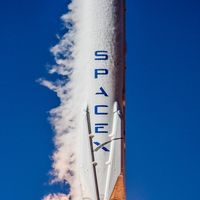Blue Origin's New Glenn: A Bold Step into the Cosmos
January 16, 2025, 10:55 pm

Location: United States, District of Columbia, Washington
Employees: 5001-10000
Founded date: 2002
Total raised: $7.53B
On January 16, 2025, Blue Origin, the aerospace company founded by Jeff Bezos, made headlines with the launch of its New Glenn rocket. This monumental event marked the company's first foray into the competitive realm of space exploration, aiming to rival SpaceX's Falcon Heavy. The New Glenn rocket stands tall at 98 meters, resembling a giant tree reaching for the stars. Its mission was to deliver a 20-ton prototype spacecraft, the Blue Ring Pathfinder, into orbit.
The launch took place at 2:03 AM ET from Cape Canaveral Space Force Station, under a blanket of clouds. The atmosphere was electric, filled with anticipation. The New Glenn rocket, with its reusable first stage powered by liquid oxygen and methane, was designed to be a game-changer in the satellite launch industry. It promised to carry payloads of up to 45 tons to low Earth orbit and 13 tons to geostationary orbit.
However, the launch was not without its hiccups. While the rocket successfully reached its intended orbit, the first stage, dubbed "So You’re Telling Me There’s A Chance," faced a critical failure during its descent. The plan was for it to land on the Jacklyn platform in the Atlantic Ocean. As it approached, communication was lost. The rocket plummeted into the sea, a costly setback for Blue Origin.
Despite this misstep, the mission was not a total loss. The second stage of the New Glenn rocket performed flawlessly, achieving its orbital objectives. The Blue Ring Pathfinder began transmitting data, indicating that it was operational. Blue Origin's team celebrated this success, emphasizing that reaching orbit was their primary goal. The failed landing attempt, while disappointing, was seen as a learning opportunity.
Blue Origin's ambitions are clear. The company aims to carve out a significant share of the satellite launch market, currently dominated by SpaceX. The New Glenn rocket is a testament to this ambition, showcasing advanced technology and innovative design. The use of composite materials and methane fuel reflects a commitment to sustainability and efficiency.
The New Glenn project began in 2015, a long journey filled with challenges and breakthroughs. The rocket's name pays homage to John Glenn, the first American to orbit the Earth. This connection to history adds a layer of significance to the launch, as Blue Origin steps into the future of space exploration.
The aerospace industry is a high-stakes game. Each launch is a gamble, a dance with uncertainty. Blue Origin's misstep with the first stage landing is a reminder of the risks involved. Yet, the company remains undeterred. Plans for a new landing attempt are already in the works for the spring.
In the world of space exploration, success is often measured in small victories. Blue Origin's ability to reach orbit on its first attempt is a noteworthy achievement. Many companies struggle to achieve this milestone, making it a feather in Blue Origin's cap. The journey to becoming a reliable launch provider is fraught with challenges, but the company is committed to learning and evolving.
The competitive landscape is heating up. SpaceX has set a high bar with its reusable rocket technology and rapid launch cadence. Blue Origin's New Glenn is designed to compete directly with Falcon Heavy, offering similar capabilities. The race to dominate the satellite launch market is on, and both companies are vying for supremacy.
The aerospace sector is not just about technology; it's about vision. Jeff Bezos envisions a future where millions of people live and work in space. The New Glenn rocket is a step toward that vision, a building block in a larger plan. Each launch brings humanity closer to the stars, igniting imaginations and inspiring future generations.
As Blue Origin moves forward, the lessons learned from this launch will shape its future endeavors. The company understands that failure is part of the journey. Each setback is a stepping stone, a chance to refine and improve. The spirit of exploration is alive and well, driving innovation and pushing boundaries.
In conclusion, Blue Origin's New Glenn launch is a significant milestone in the quest for space exploration. The successful delivery of the Blue Ring Pathfinder to orbit is a testament to the company's capabilities. While the loss of the first stage is a setback, it is not the end of the road. Blue Origin is poised to learn, adapt, and rise again. The cosmos awaits, and the journey has just begun.
The launch took place at 2:03 AM ET from Cape Canaveral Space Force Station, under a blanket of clouds. The atmosphere was electric, filled with anticipation. The New Glenn rocket, with its reusable first stage powered by liquid oxygen and methane, was designed to be a game-changer in the satellite launch industry. It promised to carry payloads of up to 45 tons to low Earth orbit and 13 tons to geostationary orbit.
However, the launch was not without its hiccups. While the rocket successfully reached its intended orbit, the first stage, dubbed "So You’re Telling Me There’s A Chance," faced a critical failure during its descent. The plan was for it to land on the Jacklyn platform in the Atlantic Ocean. As it approached, communication was lost. The rocket plummeted into the sea, a costly setback for Blue Origin.
Despite this misstep, the mission was not a total loss. The second stage of the New Glenn rocket performed flawlessly, achieving its orbital objectives. The Blue Ring Pathfinder began transmitting data, indicating that it was operational. Blue Origin's team celebrated this success, emphasizing that reaching orbit was their primary goal. The failed landing attempt, while disappointing, was seen as a learning opportunity.
Blue Origin's ambitions are clear. The company aims to carve out a significant share of the satellite launch market, currently dominated by SpaceX. The New Glenn rocket is a testament to this ambition, showcasing advanced technology and innovative design. The use of composite materials and methane fuel reflects a commitment to sustainability and efficiency.
The New Glenn project began in 2015, a long journey filled with challenges and breakthroughs. The rocket's name pays homage to John Glenn, the first American to orbit the Earth. This connection to history adds a layer of significance to the launch, as Blue Origin steps into the future of space exploration.
The aerospace industry is a high-stakes game. Each launch is a gamble, a dance with uncertainty. Blue Origin's misstep with the first stage landing is a reminder of the risks involved. Yet, the company remains undeterred. Plans for a new landing attempt are already in the works for the spring.
In the world of space exploration, success is often measured in small victories. Blue Origin's ability to reach orbit on its first attempt is a noteworthy achievement. Many companies struggle to achieve this milestone, making it a feather in Blue Origin's cap. The journey to becoming a reliable launch provider is fraught with challenges, but the company is committed to learning and evolving.
The competitive landscape is heating up. SpaceX has set a high bar with its reusable rocket technology and rapid launch cadence. Blue Origin's New Glenn is designed to compete directly with Falcon Heavy, offering similar capabilities. The race to dominate the satellite launch market is on, and both companies are vying for supremacy.
The aerospace sector is not just about technology; it's about vision. Jeff Bezos envisions a future where millions of people live and work in space. The New Glenn rocket is a step toward that vision, a building block in a larger plan. Each launch brings humanity closer to the stars, igniting imaginations and inspiring future generations.
As Blue Origin moves forward, the lessons learned from this launch will shape its future endeavors. The company understands that failure is part of the journey. Each setback is a stepping stone, a chance to refine and improve. The spirit of exploration is alive and well, driving innovation and pushing boundaries.
In conclusion, Blue Origin's New Glenn launch is a significant milestone in the quest for space exploration. The successful delivery of the Blue Ring Pathfinder to orbit is a testament to the company's capabilities. While the loss of the first stage is a setback, it is not the end of the road. Blue Origin is poised to learn, adapt, and rise again. The cosmos awaits, and the journey has just begun.
